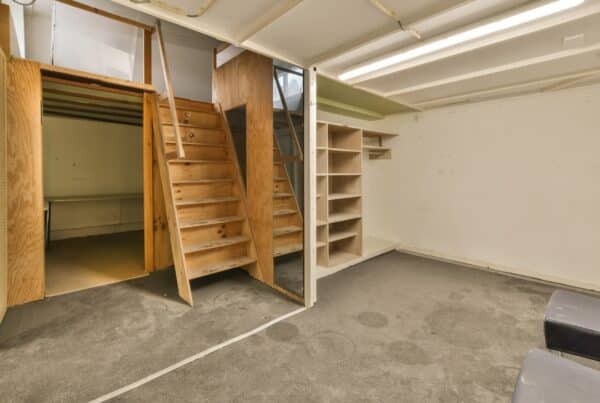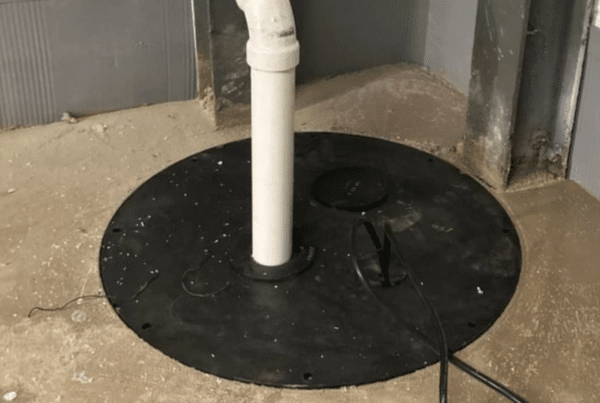Let’s face it – basements are a frequently overlooked space in the average home. Often becoming a dungeon of forgotten luggage and decorations, the basement can accumulate some sneaky (but serious) issues without the proper protection. Waterproof basement flooring is one necessary shield that your home’s lower level shouldn’t go without.
But why? The reasons are countless and extend far beyond avoiding a damp, musty atmosphere. From the health of your home’s foundation to the space’s potential, the sections below will unravel the layers of protection that this essential aspect provides. By the time you finish reading, you’ll know exactly why your basement needs waterproof flooring and even the type you prefer above the rest!
Risks of Non-Waterproof Basement Flooring
The first invaders in a non-waterproof basement are mold and mildew. Thriving in damp environments, these fungi are unsightly and can pose serious health risks, especially to those with allergies or respiratory issues. When you choose waterproof flooring, you slam the door on these unwelcome guests.
Structural Integrity
Next, water doesn’t just stay on the surface. It seeps into cracks, undermining your basement’s foundation and the overall stability of your home. Over time, this relentless seepage can lead to significant, costly damage – a risk that waterproof flooring significantly mitigates.
Financial Concerns
Think of the potential repair costs as water damage accumulates unseen. We’re talking about more than just a new coat of paint or replacing a carpet. Structural repairs can run deep into your pockets, making the upfront investment in waterproof flooring seem like a wise financial decision in hindsight.
Depending on the type and extent of the water damage, as well as a few other factors, repairing a non-waterproof basement floor could cost anywhere from $2,000-$6,000. For extensive or disastrous levels of damage, that number continues to climb.
Furthermore, a damp basement is an inefficient one. Excess moisture can lead to higher humidity levels throughout your home, making your air conditioning work overtime and driving up energy costs. Waterproof flooring acts as a barrier, maintaining a balanced, energy-efficient environment.

Water Heater Leaking, Potentially Damaging Basement Floor
Benefits of Waterproof Basement Flooring
Conversely, waterproof floors are built to withstand water and the wear and tear of daily life. This means less worry about scratches, dents, or the need for frequent replacements.
Beyond the surface, waterproof flooring offers an invisible layer of protection. It guards the structural heart of your home against moisture, ensuring that your foundation remains solid and secure.
And guess what? Gone are the days of waterproof flooring sacrificing style for functionality. Today’s market offers options that blend seamlessly with any home décor. From sleek vinyl to elegant tile, there’s a waterproof flooring option that will enhance your basement.
Regardless of the style you choose, it’s an investment that pays dividends. Homes with waterproof basements often see a significant increase in market value. Potential buyers recognize the value of a well-protected, usable basement space, making waterproof flooring a smart choice for those looking to enhance their home’s appeal.
Finally, by creating a moisture barrier, waterproof flooring helps maintain consistent humidity levels, contributing to a more energy-efficient home. This means lower heating and cooling costs and a smaller carbon footprint.
Weighing Your Options
With a variety of materials on the market, each offering unique benefits, navigating your options can seem daunting. Let’s look at the most popular choices!
Vinyl Flooring
Vinyl stands out for its versatility, durability, and ease of maintenance. Available in planks, tiles, or sheets, it can mimic the look of wood or stone at a fraction of the cost. Perfect for busy households, vinyl flooring is resilient against spills, stains, and heavy foot traffic.
Tile Flooring
Ceramic and porcelain tiles offer a classic, timeless look while boasting waterproof properties. Tiles are ideal for basements that double as laundry rooms or bathrooms, where moisture levels are higher. While installation can be more labor-intensive, the result is a sophisticated space that’s both durable and easy to clean.
Epoxy Flooring
For homeowners looking for a seamless, industrial-grade option, epoxy flooring is a strong contender. This liquid-applied coating creates a glossy, durable surface that’s resistant to water, chemicals, and stains. It’s an excellent choice for workshops, home gyms, or playrooms, offering a unique aesthetic that’s both modern and functional.
Things to Consider
-
- Vinyl is cost-effective and versatile but may not add as much value to your home as other options. For basic vinyl tile or plank, prices can start as low as $1 per square foot, with luxury vinyl tile (LVT) and luxury vinyl plank (LVP) options ranging up to $5 per square foot. Installation costs are relatively low, making vinyl a great option for budget-conscious homeowners seeking style and durability.
- Tile offers a high-end look and adds value but can be cold underfoot without radiant heating. Ceramic and porcelain tiles vary widely in price, starting around $1.50 per square foot for basic options and climbing to $5 or more for high-end designs. The cost of installation can add significantly to the overall expense, given the skill and time required, especially for intricate patterns or large areas.
- Epoxy is durable and unique but requires professional installation and can be slippery when wet. Material costs are generally lower, but total expenses can range from $3 to $12 per square foot, depending on the complexity of the job and the quality of the materials used.

Essential Basement Flooring Maintenance
The beauty of waterproof flooring, whether it’s vinyl, tile, or epoxy, lies in its ease of care, but that doesn’t mean it should be neglected. For vinyl and tile, a weekly sweep to remove dirt and a damp mop with a mild cleaner will do the trick.
Avoid using harsh chemicals that can damage the flooring’s surface or leave a residue. Epoxy floors, while resilient, benefit from being kept free of grit and grime that can scratch the surface; a soft broom and a gentle mop are your best tools here.
Beyond cleaning, being mindful of humidity levels in your basement is crucial. Even with waterproof flooring, excessive moisture in the air can lead to mold and mildew growth elsewhere in the space. Using a dehumidifier to maintain a consistent and moderate humidity level will safeguard not just your flooring but the overall health of your basement.
Additionally, even with waterproof floors, quick spill clean-up prevents water from finding its way into any tiny imperfections. Regularly inspecting your basement for signs of external water intrusion is also a wise practice. Check the exterior of your home for any issues that could lead to water seepage, such as clogged gutters or cracks in the foundation.
When to Call a Professional
-
- Persistent Moisture – If despite all efforts to control humidity and prevent water intrusion, you still find your basement damp or encounter standing water, it’s time to consult a professional. They can assess the underlying cause, which might be beyond the scope of simple home maintenance.
- Visible Mold or Mildew – Finding mold or mildew on or around your flooring is a sign of excessive moisture. A professional can identify the moisture source and recommend solutions to prevent future growth.
- Floor Damage – Should you notice cracks, buckling, or peeling in your flooring, these could be indicators of more significant issues. A flooring expert can determine whether repairs are sufficient or if a replacement is necessary.
- Renovation Plans – If you’re considering upgrading or changing your basement flooring, a professional installer can provide invaluable advice on the best materials for your space and ensure the installation meets all industry standards for a waterproof finish.
- Unexplained Odors – Persistent musty or damp odors, even after cleaning, suggest moisture issues that might not be visible. Professionals can diagnose the problem and suggest effective treatments.
Calling in a professional at the right time can save you from more extensive and expensive repairs down the line. Experts bring the tools, knowledge, and experience to address complex issues effectively, ensuring your basement remains a safe, dry, and comfortable space in your home.
Final Thoughts
In the grand scheme of home maintenance, choosing waterproof flooring for your basement is relatively straightforward. It shields against moisture and various other issues lurking beneath, all while boosting your space’s value. Even better, you can even pick your favorite style.
Make sure to keep up with the recommended maintenance for your chosen flooring type, and never hesitate to call for expert guidance when you’re unsure. To get an inspection of your basement’s condition or for questions about waterproofing it, call Buckeye Basement Solutions today in Columbus, OH, and surrounding areas.



